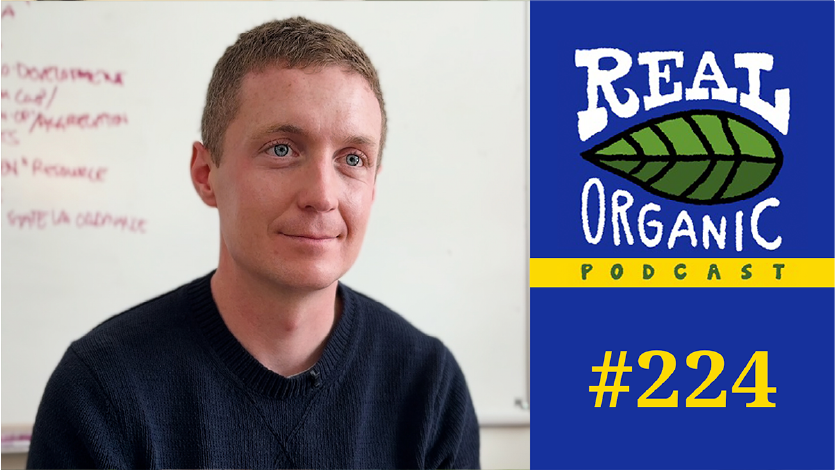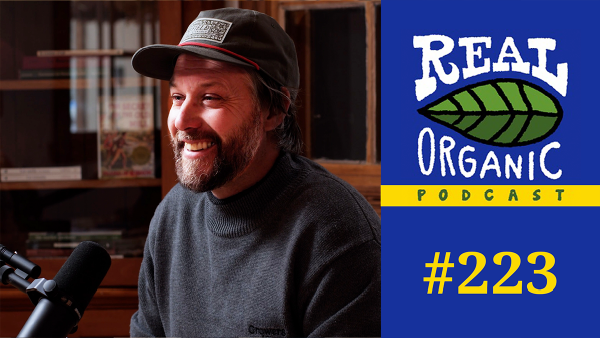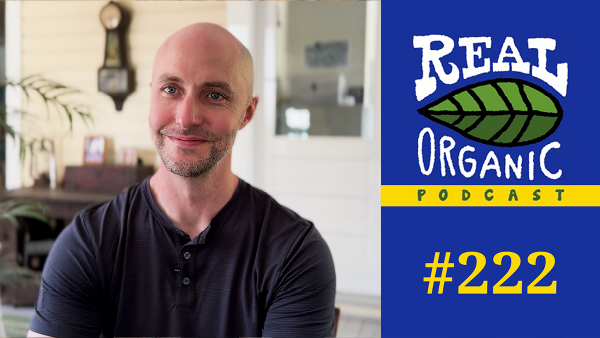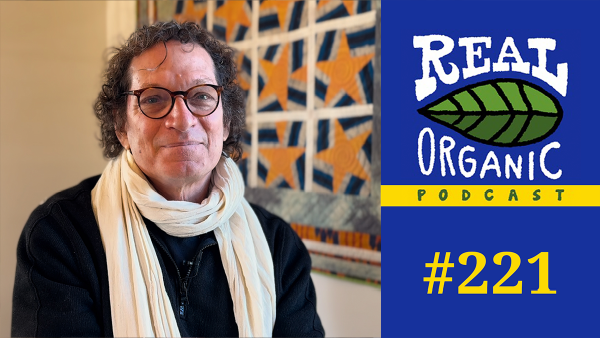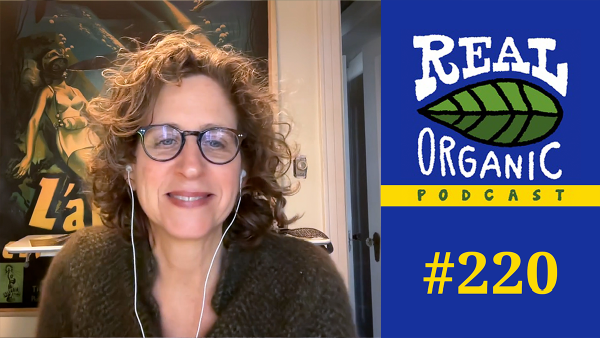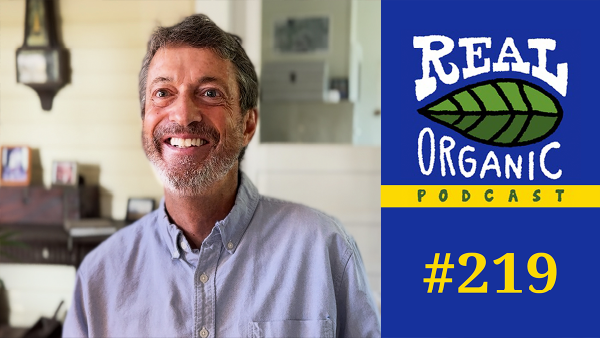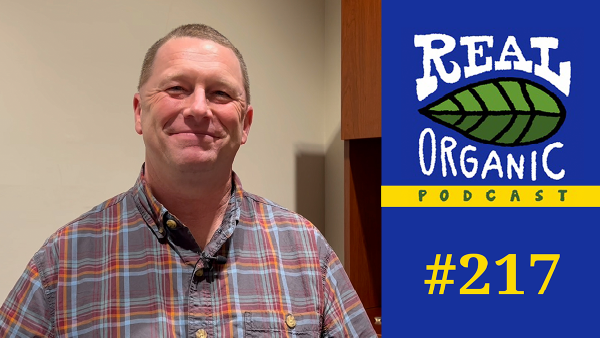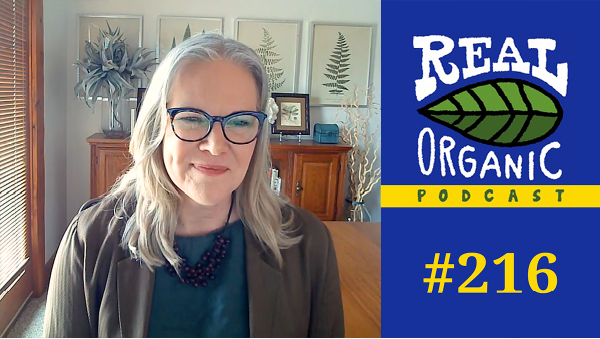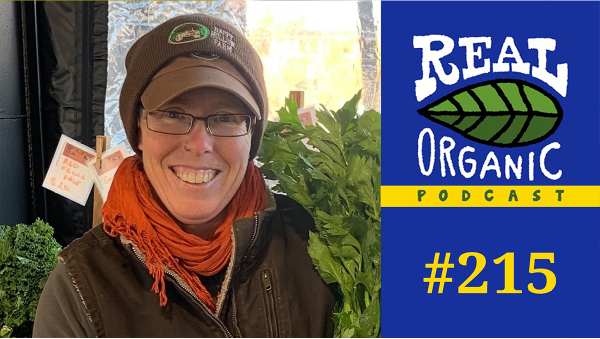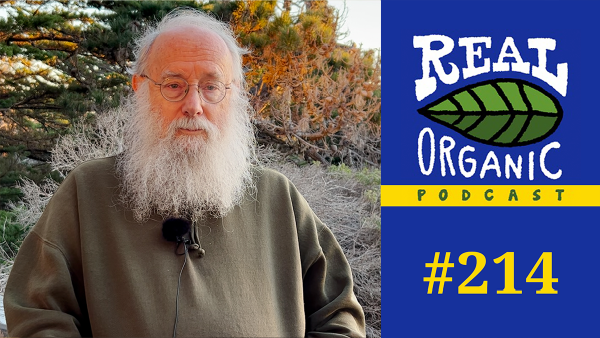Episode #218
Matthew Ingram: Counterculture’s Role In Organic Food
What do LSD, macrobiotic diets, and back-to-the-land farmers have in common? According to author Matthew Ingram, they all played a role in shaping the counterculture organic food movement that laid the groundwork for today’s organic farming ideals. In this wide-ranging conversation, Ingram explores the radical roots of organic agriculture through the lens of his new book The Garden: Visionary Growers and Farmers of the Counterculture. From soil health to social change, Ingram connects the dots between music, philosophy, and the food revolution that continues to influence what and how we grow today.
Our Matthew Ingram interview has been edited and condensed for clarity:
You can subscribe and download episodes of our show through your favorite podcast app, our YouTube channel, or stream the audio-only version here:
Dave Chapman interviews Matthew Ingram, Spring 2024
Dave Chapman 0:00
Welcome to the Real Organic Podcast. I’m talking today to Matt Ingram. Matt, it’s a pleasure to get back and talk with you again. You came and interviewed me last summer? The year before? When was that?
Matthew Ingram 0:14
I think it was over a year ago.
Dave Chapman 0:18
It was funny. You were gathering information for your new book, which is called “Retreat…” No, that’s your old book – “Retreat: How the Counterculture Invented Wellness” in 2020. Your new book is called “The Garden: Visionary Growers and Farmers of the Counterculture.” I thought I was just giving you background information about Eliot Coleman, but I ended up in the book too.
Dave Chapman 0:18
Well, I think you’re always going to be in the book, Dave. It’s probably quite good. I caught you unawares.
Dave Chapman 0:41
I’m happy either way. Eliot has been a great friend, champion for me, and a great teacher. So, it was fun to talk about him. But talking about the Real Organic Project is, of course, very dear to my heart. Gosh, what a book! You sent me an early copy, and I was like, “Oh, my god. Over 500 pages. It’s a little intimidating.” But as I got into reading it, I understood you attempted something pretty grand, which is to try and look at so many people and their little roles in building what has come to be called the counterculture, and especially around agriculture. It’s a big task. It’s one that was very dear to my heart. I was part of that time and place, and of course, it helped to form me. I’m curious; what drew you to this?
Matthew Ingram 1:42
Well, I think the first thing is, originally, I was a music fan. I was a music journalist and a record collector. I started being very interested in health methodologies. Because I think when you’re a record collector, after a certain period of time, if you’ve done it devotedly enough, you kind of get to the edges of what’s collectible. At the same time, you start thinking more about the underlying ideas. I kept coming across these health methodologies things – transcendental meditation, LSD, psychiatry, and microbiotic food. Seeing how they connected with the music scene, my interest had started to evolve.
Matthew Ingram 3:01
Then what I found, researching the “Retreat: How the Counterculture Invented Wellness,” which came out in 2020, was that the next direction that it was spreading was towards farming. Because obviously a lot of that generation went back to the land. In fact, the first person I interviewed was a guy called Craig Sams. He was a wholesaler, but he was a macrobiotic pioneer. John Lennon used to visit their restaurant in London. He’s ended up with a company called Carbon Gold, which is basically a sort of organic fertilizer company. He was, I think, the chairman or director of the Soil Association for a number of years.
Matthew Ingram 3:50
He started talking to me about health and the Peckham project. I was like, “Sorry, what’s health got to do with the soil?” I think that was the first point. When we all have these moments where something’s a puzzle, then the next step is curiosity. I think that that’s what brought me into writing “The Garden: Visionary Growers and Farmers of the Counterculture.”
Dave Chapman 4:19
I’ve just been watching an interview I did some years back with Jon Dye Gussow, a great woman who died last week. I’ve been going back and revisiting some of our conversations. She’s talking exactly about that. When she got to Columbia Teachers College, and she got her advanced degree there – I think it was a Doctorate of Education. Before she had gotten the degree, they had her teaching, and the next thing you know, she’s running the Department of Nutrition. She said she started this ecological agriculture course. It became a very famous course; she taught it for 40 years.
Dave Chapman 4:50
At first, people were like, “Farming? Why do you want to talk about farming? We want to understand nutrition.” She was like, “You can’t understand nutrition unless you’re talking about farming.” These are so intimately connected, and we don’t understand nutrition anyway, but we can understand that farming has this profound impact on nutrition. So, very similar to what you learned from…
Matthew Ingram 5:45
Before I came on yesterday, I took some time to catch up with your videos. Chuck Ben Brook was talking about nutrition as well. It’s obviously central to the organic proposition. Healthy soil, healthy plants or animals, and healthy people.
Dave Chapman 6:10
I think there’s been almost a division…I don’t know if ‘division’ is the right word, but I think of Albert Howard as being sort of the grandfather of the organic movement, and I think of Rachel Carson as being the grandmother. There are many other great ancestors of both genders, but they were both very significant in their impact in the American organic movement. Of course, Howard was all about not what organic didn’t have, but what it did have. It wasn’t just about the cessation of chemicals; it was about how healthy soil makes a very different and nutritious plant, which is different from… Rachel Carson was focused on stopping the use of these very toxic chemicals in our system.
Matthew Ingram 7:04
In a way, part of organic’s problem is that, ‘regenerative’ or ‘sustainable’ has snuck in this almost like a side door, because the preoccupation or the assumption that it is about chemicals, where it’s actually, if you look at “The Living Soil,” Lady Eve Balfour’s book, or any of those, it’s fundamentally about the health of the soil. It’s not to say they weren’t virulently against chemicals, but that wasn’t the primary focus.
Dave Chapman 7:43
Hopefully, not needing chemicals was the outcome of doing a good job with the soil. It’s like wanting the car to go faster, so you’re trying to push the speedometer instead of pushing the gas pedal. That was how you got to “Retreat: How the Counterculture Invented Wellness,” which I think there’s a great deal of truth too. Then you moved on since then, in the next five years on this project of The Garden: Visionary Growers and Farmers of the Counterculture.” Your book is about to come out. We will release this just about when it does, which is in April… We have a date?
Speaker 1 8:29
April 8th, I think. The magic day…
Dave Chapman 8:32
Wonderful. How did you name it, “The Garden: Visionary Growers and Farmers of the Counterculture”?
Matthew Ingram 8:38
Well, it’s really the Joni Mitchell song, “Woodstock.” We’ve got to get back to the garden. She pops up again and again in Joni Mitchell’s “Big Yellow Taxi.” She’s obviously talking about, “Hey, farmer, farmer. Put away those DDTs now. Give me spots on my apples. But leave me the birds and the bees.” Craig Sams loves the line in “Woodstock” because it says, “It is not only we’ve got to go back to the garden, but we have billion -year-old carbon.” She’s obviously said something probably dear to Paul Hawken, to her as well, because I understand that’s his forthcoming book is called carbon as well.
Matthew Ingram 9:33
I quoted her quite a few times as well because she does a very good interview with a guy called David Hoffman, where she talks about how the experience of LSD opened a lot of people up to the ecology. It wasn’t just the experience of taking LSD, which is obviously something that was a key factor of that era, taking it in the countryside, but it’s also this kind of idea of a holistic experience. Joni Mitchell, that’s where the title came from.
Dave Chapman 10:06
It’s a perfect tying together of other parts of your life to bring in the music. But it’s also perfect when we talk about the counterculture, because music was such a huge part of that. Could you come up with some description of what the counterculture is or was?
Matthew Ingram 10:30
The term was first coined by Theodore Roszak. I always pronounce that incorrectly. Funny enough, his other less famous coinage was ecopsychology, which is almost like yin to Yang – It’s like the other side of the equation. There’s a guy called R.U. Sirius, who wrote a book which is kind of a perennial counterculture book, “Abraham to Acid House,” which looks at that kind of impulse through the years. But I think the historical window, I always refer to, is from when Ginsburg read “Howl” in San Francisco in 1956 as the beginning date, and from when he’s thrown off the Rolling Thunder Revue by Bob Dylan, I think, in 1974.
Matthew Ingram 11:32
That’s a good starting point. Most of the things in the book happened within that window. I’m a bit softer on it this time, because it was also nice to talk about hip hop and the Bronx and how that related to guerrilla gardening. There’s a great essay written by a theorist called Stuart Hall, or he co-signs one of the co-authors. He describes counterculture within the context of Marxist theory. These are people who are quite down on it, but obviously he had some connection to it. He says it’s a disaffection of the brightest and the best. So, it’s a temporary pause in the relations of capital, however he wants to phrase it.
Matthew Ingram 12:27
I think that’s the way I like to think of it, which is that it’s a time when behavioral change was genuinely experimented with. I think to sort of telescope out from that, the problems that we’re facing – ecologically especially – require that as a society we have a behavior change. I think the counterculture is a very useful model for what that might look like and how we might progress from this period.
Dave Chapman 13:12
I suspect that younger people don’t connect emotionally with what you’re saying, in the sense that… My wife wrote a book about women mathematicians. She wrote about how the very first women who were breaking down the doors of academia and becoming mathematicians – it was very hard and they were alone. Then there was the second wave, and they were a little more accepted, but they had to be very polite. Then there was a third wave, and they were not being polite. You finally get to the current day, where they’re actually almost unaware that there ever was a ceiling that needed to be broken because they know lots of women mathematicians, and it’s not a strange thing. It’s different – the world has changed.
Dave Chapman 14:08
I did an interview; I know you listen to of Jake Guest, who was one of my teachers. Jake described, back in the late 60s and early 70s, that you couldn’t get the food that we eat now in a store. It just wasn’t available. There was no such thing as whole wheat flour in a supermarket. There was certainly nothing organic. There were a relatively small number of whole foods. Do you think that this book will appeal to younger people for whom this is truly, “I had no idea about these old people”?
Matthew Ingram 14:47
Well, obviously, I hope so. There were certain hooks in the… I think everybody knows what a hippie is. That’s the first thing. Everybody knows the Beatles. Everybody still loves the Beatles. The previous book, “Retreat: How the Counterculture Invented Wellness,” basically, it’s a Beatles book. The Beatles is on almost every aspect of it, from macrobiotic food to obviously transcendental meditation – things we’ve mentioned earlier. It ties into as a way of connecting it to people.
Matthew Ingram 15:24
But what I find, particularly, with “The Garden: Visionary Growers and Farmers of the Counterculture” – you and Eliot are obviously very good examples of that – is that there weren’t a huge amount of people from that era who traveled into agriculture and stayed there. But the ones that have actually been incredibly important to agriculture. So, in a way, it’s much more trafficking a live tradition. Someone like Patrick Holden is obviously…he went back to [inaudible 0:16:00], and someone like David Holmgren, the permaculture co-originator, these are very much alive and kicking. To that extent, if you’ve heard a little bit about any of these things – the Sustainable Food Trust, the Real Organic Project, or even organic, the idea – because a lot of the growth of organic happens through the impetus of alternative agriculture – then maybe you’ve got some purchase into the book.
Dave Chapman 16:39
Could you pick out a couple of… You have so many people in the book, and I learned so much – even about people I knew. That was very interesting and not always good. They became more human. When people are just a little bit at a distance, and we have this thing where we make heroes. It is a very human trait to make heroes out of others.
Matthew Ingram 17:08
I tried to be quite gentle in the book. I think it’s a caring look at the scene. The previous book is brutal in many respects. But yes…sorry, I interrupted you.
Dave Chapman 17:23
Oh, no. It’s a very interesting thing. I’m just curious; who were a few of your favorite people that you went, “Oh, this is so significant – what this what this person has done”? Are there any that come to mind?
Matthew Ingram 17:41
Well, there’s obviously yourself, Dave. Everybody is in awe of the work that you’ve done with the Real Organic Project. I’m going to get that out of the way. But, in a way, everybody I interviewed was remarkable in different ways. I felt really honored to be able to talk to people. But I guess I came away with the awareness of the ideas being possibly more important. So, Gary Snyder’s and Wendell Berry’s ideas. If you’re an urban person or have grown up…those ideas are so undeniable and powerful. And obviously, Sir Albert Howard’s ideas as well. Particularly he comes through the book. In a way, although I interviewed about 18 to 20 people, everybody was remarkable. It was still ideas that I came across that were more significant…
Dave Chapman 19:00
Speaking of that, I was fascinated when you were writing about Henry David Thoreau, whom we all like. We all like Thoreau. We appreciate what he did. But again, when you talk about his actual experiences living at Walden Pond, it was almost living in the suburbs. Then he’d walk into town for dinner. I have no judgment about that. I think that’s wonderful. But his book “Walden” was, I think, transformative for our culture, as was “On Civil Disobedience,” which involved him going to jail for one night. The jailer wanted to pay his fine because they were friends. He says, “Let me just pay this.” Thoreau was in jail because he wouldn’t pay his poll tax because of the Mexican-American War?
Matthew Ingram 19:53
He didn’t want to. Then his aunt, I think, was the one who bailed him out. He was very annoyed that she paid the bail.
Dave Chapman 20:02
But on that one night in jail, he managed to put together this beautiful book that inspired Gandhi and Martin Luther King.
Matthew Ingram 20:12
He really pitched it. It’s a lesson to us all, isn’t it? About the power of ideas. I think, in terms of the ideas, that was one of the feelings that I came back with. Actually, listening to your friend Jake talking about how they sat around at night with a hurricane lantern, reading the original organic books – he gives a very good reading list, actually. That thing of organic itself, it’s actually a history of books. It’s “The Soil and Health,” “The Living Soil,” and, in a way, it’s a history of ideas that filters down into action. I guess the same is true of “Agriculture Course: The Birth of the Biodynamic Method,” the Steiner book, or Masanobu Fukuoka’s “The One-Straw Revolution: An Introduction to Natural Farming.” Books and ideas, which I know is not nothing that would make sense to you because it’s a very theoretical thing you’re doing with the Real Organic Project, but …
Dave Chapman 21:34
I read all those books too. I actually grew up on a farm, but I was never a good farmer. I got re-excited or excited for the first time about farming as a result of this moment in time when this huge cultural wave was washing over us. I started an organic garden, and I loved it so much. I thought, “Well, I wonder if I could do this for a living.” It grew from there.
Dave Chapman 21:34
When Jake talks about sitting by that kerosene lantern and reading these books, he was trying to write the first organic standards in the Northeast. He was trying to define, “Well, what is organic? We know that we don’t want to do chemical agriculture; we don’t want to do the agriculture of Syngenta and DuPont, but what will it look like?”
Dave Chapman 22:28
Jake was not a farmer – he had no experience at that. He was somebody who was at a commune, starting to figure out how to grow food for the commune. I think it’s such an interesting moment where… There certainly were farmers who came to organic. Just leaping to mind, I think of Francis Thicke, who was from a farm family in Iowa. He was inspired by all this. He was part of the anti-war movement. He was part of this countercultural wave that was washing over us. But he said, “Well, I just took a field, and I didn’t spray it. I didn’t tell anybody. I just started to farm it organically, and it worked pretty well. Then I told my brothers and my parents about it, and they’re like, “Wow.”
Dave Chapman 23:21
Now he’s just retired. He just passed his farm on to younger people. His brother is still farming organically – all real organic. Most of that movement didn’t come from people like Francis Thicke – it mostly came from people like Jake, who didn’t have any farming experience and grew up quite educated in a formal sense. He went to Dartmouth and decided he was going to go somewhere else with his life. That was that countercultural movement. I think it’s significant – I don’t attach any personal good or ill to the people who followed it. We were just in a wave, and it’s what made sense. It’s what the world offered, and we went, “Oh, yes, that makes sense. I will do that.”
Matthew Ingram 24:18
[inaudible 24:19] was it, Dave? You had to have a farming background, didn’t you? Either, if I remember?
Dave Chapman 24:24
I did grow up on a dairy farm. I was not of the farm. I knew how to drive a tractor. I came from much more of an educated background, except I never went to college. I turned away from it. It was at that moment in time when I went, “This isn’t what I want to do. I want to go out and see the rest of the world.” So I did.
Matthew Ingram 24:50
That sounds somewhat like Wendell Berry. I know that he went into academia and then came back to the farm after starting out. Because it seems so far off everybody’s radar, the urban-rural divide is so pronounced, and some huge amounts of the population are obviously born and raised in a rural-urban situation. How did it creep into your life? How did you see it creeping into the lives of people around you, this idea of working in the countryside?
Dave Chapman 25:39
Well, I did grow up in the countryside. I lived a little bit in the city. I lived in Boston, and I lived in Cambridge…
Matthew Ingram 25:48
For your generation, how did you see it creeping in?
Dave Chapman 25:53
Well, it just looked like where the fun was. When I came to Vermont, there were a lot of young people. There are a lot of parties. It was easy to find people that you might become partners with; it was easy to find people that you shared music with and what was fun and entertaining. We were remarkably not ambitious professionally. Nobody really seemed to care about what their career path was. Everybody just worked at a restaurant or at Army-Navy store or construction or whatever. We worked at whatever. I don’t think that’s how people were defining themselves – that group of people at that time.
Matthew Ingram 26:50
I came across a quote in “Total Loss Farm,” which is not very much about farming, actually, which is one of the books about the communes, which is that the Rolling Stones were ruling California, but the band was for Vermont. I’m not even sure if they weren’t upstate in New York, actually. But did you find that the music played a part in your generation’s decisions?
Dave Chapman 27:18
Well, I think we all shared the music, sure. We all listen to that music. It was a big part of our lives. It’s interesting to say, “Were we formed by it?” Of course, we were. When you’re quoting Joni Mitchell, I know the song, and it plays in my head. It was important to me – that music was important. I don’t know that I thought of it in that way; it was just the water we swam in.
Dave Chapman 27:59
I read “Total Loss Farm” when I came to Vermont. I remember it. There was one person at the farm who had a team of oxen that he was raising and training, which I went on to do myself. I never met any of them. I never met Ray, or Veranda, or any of those folks, but I read the book, and I very much enjoyed it.
Dave Chapman 28:32
What do you think that the counterculture didn’t understand about itself back then? A lot has happened since then, and we’ve learned, and we’ve changed. One of the things that I’ve seen – that’s interesting to me – is the economics of it all. Your stories about The Farm in Tennessee were powerful for me. I also read “Monday Night Class” and “Caravan.” I never went down, and I don’t think I would have liked it. But I was impressed by them. I do know Michael O’Gorman and have interviewed him. He, of course, ran the farm part of The Farm for about a decade.
Dave Chapman 29:27
It finally crashed on the rocks of debt. It didn’t work financially. As I read your book, I see so many examples of where it didn’t quite work financially. It’s okay. People can choose to be voluntary peasants. As David Weinstein says, we tried to substitute our blood, sweat, and tears for money. When people started farms – and he’s talking in California primarily – and all these young people were starting organic farms, and they didn’t have money. They just work like dogs for almost nothing.
Matthew Ingram 30:07
There’s a lot of skill. Wendell Berry picks up something. I think it’s in an interview with Mother Earth News, he says, “Enthusiasm will only get you so far. It will get you to the end of the day, but it won’t get you to four in the morning.” Obviously, the stereotype about hippies was that they’re very relaxed; however they achieved that. There were a lot of very hardworking people. When you read Gary Snyder as well, it’s a lot of skill, a huge amount of skill and knowledge that is very hard won. I think that the advantage of them being volunteers, so to speak, as in coming to farming from different backgrounds, there was a lot of enthusiasm, and there was a will to learn, and people survived that.
Matthew Ingram 30:32
But then, on the other hand, I think the skills weren’t there in many cases, and the economics were stacked against them. One of the things that comes up again and again is that quite pretty quickly, in the early 70s, the economic math of making your own food just about made sense. But as you get into the early 80s, it doesn’t make sense. It’s very difficult. I’m sure you know, and a lot of farmers know. It’s very difficult to do and do profitably. Certainly, as the decade went on, it became much harder to achieve, and the math of it just didn’t stack up. Some communities became more integrated into the rest of the economic rural community, taking on different jobs.
Matthew Ingram 32:35
The Farm is probably a very good example of where Sir Albert Bates, who I talked to from The Farm, got into making soy ice cream. But a big part of the farm was into CB Radio. They sort of diversified away from farming. When there was that big collapse of farming, when they got overextended, and there was a very big… I think it was a big frost or something, wasn’t there? In Florida. It wiped out all the crops, and so they were totally exposed to that. What I think is true against that as well, though, is that the people who survived the whole process became extremely skilled and also acquired a durability.
Matthew Ingram 33:42
The hippies – for want of a better word – who survived the whole process ended up with a very deep skillset, a very deep understanding. At that point, the philosophical drive really came into effect. Someone like Patrick Holden or David Holmgren or Eliot, for instance, or yourself, they’ve survived the economic difficulties. At that point, once they finally got some kind of security, then the philosophical aspects of it came to the fore.
Dave Chapman 34:40
I’m different from Eliot. Our farm is definitely an economic entity in a way that his farm isn’t. His farm has maintained more of that self-reliant, independent… We’re not going to be even selling into the system. We sell into lots of supermarkets. We have gotten bigger in order to do that. We use a lot of energy. We do lots of things. I’m not sure I’m a fan of all of it, so I love what Eliot is doing and has done. But I’m just curious; you mentioned Patrick Holden. I go back to that famous conflict between him and Lady Eve about the future of the Soil Association, which is the big organic association in England. Lady Eve Balfour was really the founder of it.
Dave Chapman 35:33
A generation later, Patrick Holden, Peter Segger, and others came along. They wanted to create organic standards because they said, “We have to make a living. In order to do that, we’re going to have to identify what is organic in the marketplace.” In a sense, they were saying we have to create a brand. They were bringing an economic perspective to this. I’ve talked to Eliot about this, and he’s quite a bit on Lady Eve’s side. I said, “I think they were both right. I think Lady Eve was right that if that happens, something will get lost. Maybe something that’s critically important. Patrick was right, which is, if we don’t do that, this will never grow, and also something will be lost that is critically important.” What are your thoughts about that?
Matthew Ingram 36:27
I [inaudible 0:36:29] this by saying that I’m the kind of the show biz end of all this. I’m not a farmer, and I don’t have to deal with the consequences to a huge extent. With the book, I actually have to tread quite carefully. I’ve become a bit more aware of political balances and not upsetting people. But I think I’m definitely on the regulation side. I’m a hundred percent on… I don’t know whether you would classify yourself as being on Patrick Holden’s side, but I think that what you represent in terms of regulatory…because it’s got to be fair. You’ve got to be able to say that something is something and everyone to believe in it. I don’t think that’s an exercise in branding; I think that’s just an exercise in truth. That’s my take on it.
Matthew Ingram 37:19
For instance, his ideas with the Sustainable Food Trust – that would be amazing because it’s the Wild West at the moment with sustainable. If you can regulate that, if you can create a standard…he’s basically, as I see it, he’s making a… You’ve created an add-on label, which is effectively the same thing. But if you can create a policy framework in waiting, which is how I see the Sustainable Food Trust, I think that’s great. I think it’s absolutely what needs to happen. Just as happily, if people just follow the organic rules, as certainly as the Soil Association has them arranged in the UK, I wouldn’t have a problem with that – with keeping that on. But there are so many arguments for moving with the times that I think that, however it’s done, some kind of regulations for sustainable farming are good.
Dave Chapman 38:35
Of course, the challenge is, Lady Eve, I don’t know if this was her point, but the problem is that regulations are easily abused. In America, we’re dealing with that big time with the National Organic Program. We’re not even sure if there will be a National Organic Program in a year because they’re defunding everything, and certainly that is one that’s going to be very vulnerable. It’s a small program – very small – but I have a feeling most of their money will be cut. I’m curious; just to be realistic, we know that regulations involve the government, and we know that there’s something called regulatory capture, which is so common.
Matthew Ingram 39:27
Well, regulatory capture doesn’t happen… It obviously looked like it was a great idea to get the American government involved in the organic standard. But that isn’t how it works in the UK. In many countries, the organic regulations aren’t overseen by the government. I guess what you’re saying with regulatory capture is it’s not just specific to the US, but what happened is that, with CAFOs and hydroponic, organic has been diluted or completely destroyed as a concept in America. But I don’t think that regulations per se are the problem because they’re reasonably stable in the UK. Part of the reason I was interested in the Real Organic Project was this concern that what you’re experiencing is going to soon be visited on other countries. But I’m not sure if I see that happening in the UK, really.
Dave Chapman 40:39
Well, we hope that that remains, because then you become a lighthouse for us. I am concerned because the US is so big. We see it happening right now in Australia. There’s a serious debate there about whether or not they’re going to certify hydroponics. The pro-hydro industry is saying, “America does it. Why can’t we? They’re the biggest market in the world.” It’s going to come everywhere. It will be a debate because there’s so much money to be made – one way or the other. We’ll see how that goes.
Dave Chapman 41:17
Let me ask you, Matt. I thought to talk about Eliot, which I was happy to do. I’m curious; in all your research, what in your mind is his place in the development of the organic movement in America? I actually think it goes beyond America; it’s in the world. What did you learn? What’s your impression of Eliot’s role…?
Matthew Ingram 41:45
I guess I got the feeling that actually that wasn’t something that he was very interested in. He was actually very – and I have the greatest respect for that – preoccupied with refining his practice, and the self-fed farm, which is a kind of refinement of his ideas – plowing in green manures. He wouldn’t claim that was an original idea, but he’s refining it. I think that his intellectual curiosity in the way he’s explored all these different avenues, like growing food in the cold, the different machines he’s devised, the soil blocks, and growing at different attitudes – the same light levels around the world. Now obviously he’s with the green manures. He’s just curious and passionate. I don’t see him being particularly preoccupied by his legacy or his…
Dave Chapman 43:19
I think Eliot was more obviously political in his youth. He was the director of iFOAM in his youth when iFOAM (International Federation of Organic Agricultural Movements) was just beginning. It is the umbrella for the world organic movement. Now it’s become much more international. Back then, it was mostly Europe, but now its members and its leadership come from all over the world – a lot in Asia and Africa. But that was something that he was one of those early voices. I think he did have a great awareness that organic was important and we needed to figure out how to develop it. I don’t think he ever was a fan of standards, and he was never a fan of certification. That’s absolutely true.
Matthew Ingram 44:22
He might have a real organic, but he’s not organically certified. Is he?
Dave Chapman 44:27
No.
Matthew Ingram 44:29
Really hardcore people who I’ve spoken to – hardcore is probably the wrong word – have… for instance, Charles Dowding, who’s a very well-known no-dig market gardener in the UK, is not organically certified. Patrick Holden doesn’t really talk about it, not on any of his products or anything. You can buy his cheese in the Neil’s Yard store…it is actually organically certified, but he doesn’t talk about it. In fact, that was something that I came across in the book. That although it’s important, there are people who…I’m not sure what the drivers are, but people don’t always go down that route.
Dave Chapman 45:23
Well, I think for some people, like Eliot and probably Patrick, and Gabe Brown, they are their own brand. People know, respect, and trust them. If they know that it came from that farm, it’s what they want. That’s not wrong; that’s right. It’s just that in our complex world, most people don’t know their farmer…
Matthew Ingram 45:48
No, of course. That’s where regulations come into it. Again, to go back, it’s that question of trust.
Dave Chapman 45:57
Yeah. What do you think of the tension between organic as a movement about biological farming and a movement about social change that includes challenging capitalism, corporate hegemony, racial inequality, and environmental degradation? When I came into organic, that was part of it. It was a package. We cared very much about those social issues, and organic was part of the package. Now, as it’s grown in the marketplace – which is wonderful – people turn to it because they really want an alternative to chemically produced industrial food. They really do. That’s not what they want to put in their body. That’s not what they want to feed their kids. If they have the choice, almost everybody would say, “Sure, I’ll take the stuff without the pesticides. Thank you.”
Dave Chapman 47:06
There was something called ecofascism, which was actually when the Nazis embraced biodynamic agriculture. I’ve read about it. It’s very strange, but it happened. That’s a whole other story we don’t need to get into. But what became clear to me is it is possible to separate deep biological farming from all these other social things that were, in America, very much a part of our movement. What do you think about that vision? Do you think that what you see as organic does involve all of those social…?
Matthew Ingram 47:50
This is, in a way, why I think one of the strengths of the book, which I see as sort of a conceptual reset. It’s like saying, “Okay, this generation’s preoccupations that came out through the 60s, for whatever reason. They were interested in – as you put it – a whole package of ideas, of which organic was just one part of that.” Those ideas, as you do, belong together, which is the argument, essentially, I make in the book. This concept of holistic connection, that they do belong together. I think that by telling the story of that generation and of those radical preoccupations, I guess what we’re saying is that there are ideas which upend the status quo.
Matthew Ingram 49:00
By doing that, I think my aim was to show how organic is fundamental to those. A lot of other ideas – psychology. Wendell Berry talks a lot about race and how that whole package belongs together. I think when you see that package together, you can see how all these interlopers are into that field. Even if you’re talking about growing food in a lab to create a solution, they just don’t have that wholesome integrity and that historical drive and that sort of conceptual strength.
Matthew Ingram 49:02
That whole package belongs together for a reason. We shouldn’t be embarrassed of…there’s a lot of embarrassment about the idea of a hippie. That’s why, at the very conclusion of the book, it’s like, “Well, this story, as we’ve told, is the answer to what we’ve got to hold on to.” That’s how I see it.
Dave Chapman 50:25
Okay. You would say it is important that it be the package? That it’s all an ecosystem, it’s all co-evolving, it goes together?
Matthew Ingram 50:41
Yeah. It’s become almost like a cliche of…you’re asking people not to grow monocultures. Why can’t we see diversity in farming? It’s a very serious point. Just the connection to nutrition and ecology…for me, the biggest eye-opener was Wendell Berry talking about race. Because his argument is that by passing on manual labor to Black or Hispanic or indigenous peoples – imported to do the hard work – that is the root, not only of racism, but also mental illness. It’s quite difficult to read Wendell Berry’s summons because sometimes you went to [inaudible 0:51:52]. “Can you really say this? Is it okay to say this?”
Matthew Ingram 51:55
I was quite careful to run it past a number of important Black stakeholders, and there was no problem with it, which is that white people have lost some fundamental ability to cope with reality – which is what you describe as mental illness – by passing off manual labor to other people and the whole paramedic idea of society. Right across the board, that’s very fundamental to his ideas, certainly.
Dave Chapman 52:42
That’s right. Wendell has a great respect for not enduring that labor but celebrating it and embracing it, as is Eliot.
Matthew Ingram 53:00
We can all share that work, but it’s just that they have not been separated out in it. Michael O’Gorman has been a passionate advocate of especially Mexican workers. They’re working for Michael, but he’s out there doing the work as well. It’s not as cut and dried as it was in my [inaudible 0:53:32], but it’s just that awareness of it and the participation in it.
Dave Chapman 53:39
Most people don’t know who Michael O’Gorman is. I do. I got the privilege of meeting him at EcoFarm. Then, the next year I said, “Michael, we need to do an interview.” And we did. We haven’t released that yet. But an interesting guy, wasn’t he?
Matthew Ingram 53:58
Amazing, yeah. He was basically the farmer at Stephen Gaskin’s The Farm commune in Tennessee, which was like the mega commune. Probably, short of Auroville, it was the biggest hippie commune – which was the city in India. He went on to run about, I think, five very major organic farms afterwards and now, more recently, has been helping veterans farm. He’s got an incredible organization helping veterans farm.
Dave Chapman 54:37
That’s right. Before working with Stephen Gaskin at The Farm, he was a racial rights activist as a teenager. He was working with John Lewis. Amazing. Again, being there at the beginning of something huge.
Matthew Ingram 55:00
He always said, in fact, that he didn’t see himself so much as a hippie as a civil rights activist. But then I think that partly reflects that there’s a discomfort about that generation still – which, obviously, I don’t have a problem with – but I think he had a discomfort with Stephen Gaskin and that situation.
Dave Chapman 55:31
I thought you handled the part about Stephen Gaskin very well in your book. Stephen obviously had some great failings or challenges as a human being, but you said, “But basically, he’s a really decent guy, unlike so many of the gurus who, behind the curtain, seem to be kind of horrible people – but he wasn’t.” But he also had his challenges, didn’t he?
Dave Chapman 56:09
There’s so much, but we’re running out of time. As organic has evolved to become more economically viable – this is kind of a big question for me – has it lost its soul, or is it losing its soul? That’s what I love about your book. You’re saying, “None of this is simple.”
Dave Chapman 56:32
It wasn’t The Farm in Tennessee that was defining this movement. There was a movement here and a movement there, and people were doing this and people were doing that, and they probably had a sense that they were doing something significant. But I don’t think anybody thought, “I’ll be in a history book someday.” They were just trying things. They were trying to build a life and a world that they believed in.
Dave Chapman 57:01
Those raw early days – and reading your book was in some places painful for me, as I remembered times in my life, and they were pretty raw, unformed, scary, and we didn’t know what we were doing. Do you think as things become more established, is something precious being lost? Is there something precious that we can look at to remind people we need to get back to the garden?
Matthew Ingram 57:38
Yeah. I definitely come at this from a very urban perspective. In a way, it’s an unusual bridge from the urban to the rural because there’s a lot of questions of spirituality and what have you that flows through the book – and not in an obtrusive or onerous way, I don’t think. But it’s quite a strong theme. Certainly, from an urban perspective, it falls more to people to participate by buying the food or gardening – something I talk about quite a lot – just the idea of actually understanding how to grow things and just doing it on your windowsill.
Matthew Ingram 58:35
But as for the broader picture, it’s such a difficult thing. For the practice of farmers, I couldn’t feel like I could comment on that, even. Because it seems so difficult, and it seems that the whole scene is under so much pressure to survive. And obviously, with these political things that you’re having to cope with, with the Real Organic Project. I guess I have an enthusiasm for the idea that…if there was something that I would like to see from the book – which is very inflated of me to say because I’ll probably sell 100 copies and disappear – but it would be nice if people were prepared to take that leap of faith to be volunteers and to go back.
Matthew Ingram 59:35
This idea of working on smaller farms, that would be a wonderful thing that it could grow, but it’s such an unusual period of history, and the pressures are so difficult that I just don’t know. I’m not sure I’m in the position to come up with some grand plan of… All I know is what is the right way to do it. Unquestionably, the right way to grow food, eat food, and behave. I think that’s as much as I can take from that history.
Dave Chapman 1:00:24
All right, Matt. I always give people a chance at the end of an interview. Is there something that you would like to say, or something that we should have talked about that we didn’t get to?
Matthew Ingram 1:00:38
The only thing I would say is – and I’ll try and be brief – this great idea of Gary Snyder’s. He wrote a book called “The Practice of the Wild.” It was a revolutionary idea for me. Snyder sees works of culture like poetry, music, and writing as practices the wild. They are connected. They are the same thing as growing food organically. They’re a sort of a participation with nature. I thought that was a very nice way of connecting things that people understand in an urban context and that people ought to understand about growing food. Those natural behaviors, and that kind of inspired music, or music of a certain quality, or writing of a certain nature, have a corollary with organic growing.
Dave Chapman 1:02:08
Beautiful. I’ll think about that. Matt Ingram, your book is coming out in April, “The Garden: Visionary Growers and Farmers of the Counterculture.” I hope that you sell far more than a hundred copies. I think it’s a great book. I really do. I’m sure that a couple thousand people will listen to this interview, and I hope that they all go out and buy a copy. It won’t be wasted money or wasted time.
Matthew Ingram 1:02:42
Well, thank you so much for having me. It’s been such a pleasure. I was watching you and Eliot talking three or four years ago – I think it was on one of the earliest Real Organic Project videos. It was a real inspiration to me. It’s been a real honor to come along and be on the podcast myself. I’m very grateful. I’m very grateful for the work that you’ve done and that you’re doing. It’s very brave. You must be dispirited because I sometimes see you, and I worry for you. It’s so good.
Dave Chapman 1:03:19
All right. Thank you, Matt, very much.
Matthew Ingram 1:03:22
Thanks, Dave.


